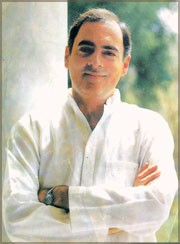Remembering Rajiv Gandhi
Today marks the 63rd birth anniversary of former
Indian Prime Minister Rajiv Gandhi.
R.K. BHATNAGAR
NEW VISION FOR INDIA: 23 years ago on October 31, 1984 at the
tender age of 40, Rajiv Gandhi became the youngest Prime Minister of
India, perhaps even one of the youngest elected heads of Government in
the world.
His mother Indira Gandhi was eight years older when she first became
Prime Minister in 1966. His illustrious grandfather Jawaharlal Nehru was
58 when he started the long innings of 17 years as free India’s first
Prime Minister.
As the harbinger of a generational change in the country, Rajiv
Gandhi received the biggest mandate in the nation’s history.
Born on August 20, 1944 in Mumbai he was just three years old when
India attained its independence with Jawaharlal Nehru at the helm of
affairs.

His father Feroze Gandhi as a Lok Sabha Member had earned reputation
as a fearless and hard working parliamentarian. Conscious of history,
Rajiv told the nation in his first broadcast as Prime Minister, “the
nation has placed a great responsibility on me by asking me to head the
government - I shall be able to fulfil it only with your support and
cooperation. I shall value your guidance in upholding the unity
integrity and honour of the country”.
A cherished dream of Rajiv Gandhi was to build an India that was
self-sufficient, self-reliant, strong, prosperous and modern in all
aspects. He realized that the future of India depended on technological
modernization, higher productivity and rapid advancement towards social
justice.
Realising that agriculture was the mainstay of India’s economy, the
young Prime Minister stressed the need for faster and even agricultural
growth which required the extension of Green Revolution to the rain
shadow regions.
His Technology Mission for Oil seeds and the National Project on
pulses have taken shape out of this strong desire to achieve a turn
around in agriculture sector.
Rajiv Gandhi was aware of the fact that inordinate delay in
deliverance of justice was in a way tantamount to the denial of justice.
But, he also knew that the courts were over-burdened with too many
cases.
In order to relieve the pressure on courts, he gave a new thrust to
the judicial system by introducing the Lok Adalats. His resolve to
cleanse the public life from scourge of “Aayaa Rams and Gaya Rams”
resulted in the Constitution (52nd Amendment) Act, 1985 popularly knows
as Anti-Defection Law.
Rajiv Gandhi had tremendous confidence in the youth and expected much
from them in the task of nation building. To give the youth of India a
feeling of active participation in the democratic process, he lowered
the voting age from 21 to 18 years. This way he brought almost 50
million young day dreamers into the electoral system.
He performed his role as the Leader of the Opposition in the most
dignified and democratic way. Even though the Congress emerged as the
largest single party in Lok Sabha in the 1989 General Elections, he
preferred to sit on the opposition benches saying he did not have the
clear popular mandate.
He was well-versed with the principles of parliamentary democracy and
the role of strong Opposition even when he was Prime Minister as he
always kept the interests of the nation above his personal or party
interests.
Rajiv Gandhi was a great humanitarian. He joined politics due to
twists of fate and history. Ramji Bhai, a refugee from Pakistan migrated
to Delhi after partition and set up a tailoring shop in Connaught Place.
Ramji Bhai recalls that when Rajiv visited his shop in 1964 after the
death of his grandfather Jawaharlal Nehru, he thought him for an
American boy. Even as a pilot in Indian Airlines he continued to visit
Cassino Tailors owned by Ramji Bhai.
‘Rajiv Baba always liked simple and plain clothes’, Ramji Bhai
recalls as he proudly recollects the sweet and unassuming nature of
Rajiv even after becoming Prime Minister.
Niramala Deshpande, noted social worker and Gandhian feels Rajiv
Gandhi and his family are highly religious but not in the traditional
sense.
“Rajiv did not believe in rituals but was deeply religious. Both
Rajiv and Sonia respected all religions and celebrated festivals like
Diwali, Holi and Dusshera. Sonia planned for the festivals like a
traditional Indian daughter-in-law. I would say Sonia is more Indian,
more Hindu than any other Indian daughter-in-law”.
R. Venkataraman was close to Rajiv during his days as Vice President
and President. Generational gap did not come in the way of their
friendship. “Rajiv is a brave and dedicated son of India,” says RV, as
the former president is known in his close circle of friends and
admirers.
It is unfortunate that a Rajiv’s eventful public life came to an
abrupt end on 21 May, 1991 at Sriperambudur, near Chennai, when he was
on his come back trail.
(The writer is a former press secretary to the
President of India.)
Syndicate Features
|

